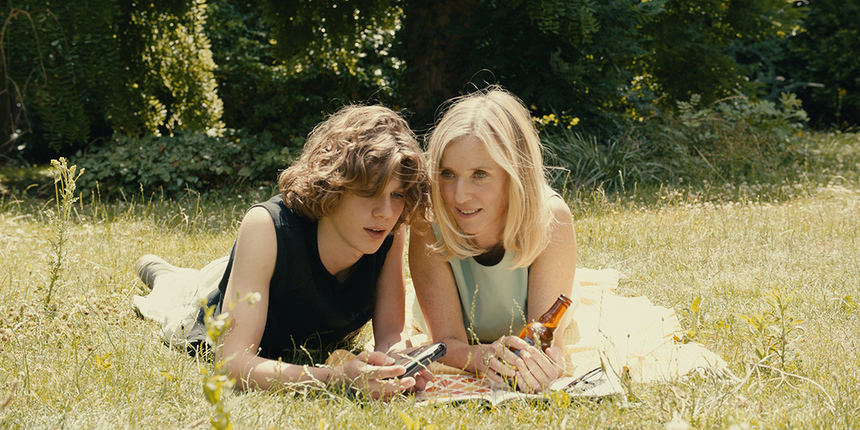Toronto 2023 Review: LAST SUMMER, Sex and Power in the Heat of the Season

While it's unusual for an auteur like Catherine Breillat to remake another, recent film, it's not a surprise, in this case, given the subject: sex and power. The filmmaker behind daring works (to say the least) such as Anatomy of Hell and Fat Girl has no qualms about blowing past boundaries and exploring taboos that would make most others blush. Brellait delights in making her audience squirm.
Last Summer tells the story of a middle aged woman who risks her family, her career, her reputation, on an affair with her teenage stepson. Challenging what would be seen as some sort of star-crossed-love affair, Breillat exposes such a union for the extreme unbalance of power and the abuse that it is. Based on the 2019 Danish film Queen of Hearts, while less sexually explicit than her other films, is still very much explicit on how beautiful and harmful illicit sex can be.
Anne (Léa Drucker) seems to have an enviable life. She's married to the wealthy Pierre; they have a large home in a small city; two beautiful adopted daughters, and Anne has a succesful career as a lawyer, where she seems to specialize in helping young victims of abuse and assault. At the beginning of this summer, Pierre's son from his first marriage, Théo (Samuel Kircher), is brought to live with them, as Pierre plans to make up for the years of neglect. At first, Théo is a spoiled brat; but a shift that comes with kindness quickly erupts into a passionate sexual engagement with Anne, one that she knows is wrong but she can't resist.
Which at first, and frankly for a while, seems slightly unfathomable. While Théo is very sweet with his little sisters, he shows little but disdain for his father and Anne. Even when they come to a truce, there seems little to recommend him, apart from the firm body and energy that come with youth (he barely even needs to shave). An early scene shows a loving, sexual encountere between Anne and Pierre: he is mothodical and captivated by his wife as he makes love to her, while she tells him of an older man on whom she had a crush when she was young. In her mind at that that, he was ancient; she realizes now he was only in his thirties, younger than she is when telling the story. It's the kind of comfortable yet loving sex many of us might hope for with our longterm partner. On the contrary, not surprisingly, sex with Théo is hard and passionate - Anne makes noises she hasn't for years, she trains Théo to perform oral sex exactly how she likes, she has a spring in her step that has been missing from her 'stale' years. With her husband often on business trips, Théo fills a need in her daily life and a gap that has been missing for some time.
While they are not related by blood, they are still family; and while Théo is technically past the age of consent, there is still a huge difference in the power they have not only within the family, but within society. Media in much of the world would demonize (as it should) a man of Anne's age being with a girl of Théo's age, but the older woman/teenage boy dymanic is somehow seen as acceptable, a terrible double standard that would see young men be victims of abuse.
Is it all just boredom for Anne? She spends her working life protecting young women who have been the victims of older men, whether they be strangers or family, so she is well aware of what lines she is crossing. Is she just caught up in the sex? Is she tempted by the power? Does she want to see how and why these men whom she has spent her career fighting, man age to too often succeed in their abuses?
Breillat presents Anne as the perfectly modern woman who truly has it all, and the money and power to continue having it all. Her perfectly sculpted business attire and high heels mark her as prominent, cold, and untouchable. With Théo, we see her relax as likely hasn't for years. But when he perfect world is threateded, she knows exactly what to do. Why? Because she has exposed men who have behaved like her for years. She knows exactly what to say to be believed, she knows how to turn Théo's youthful (albeit shitty) behaviour to her advantage. She told Théo that her greatest fear was losing everything, and she meant it.
Drucker plays all these emotions with the most precise and frighening calculations. We might (and likely do) find perverse pleasure in her affair with her stepson, and stare at her in dismay when she turns on him. We know people like this, and likely we might have behaved like this, if we were ever in a position of power to make lies seem like the truth.
Breillat might be know for exposing sexual perversion, but it's really the emotional violence that is at the heart of her work, and she exposes it yet again in Late Summer. She knows exactly what lies in our dark hearts, and how we might let that darkness consume us.







